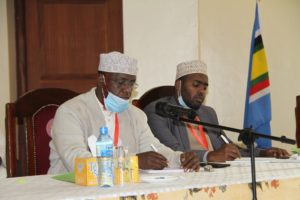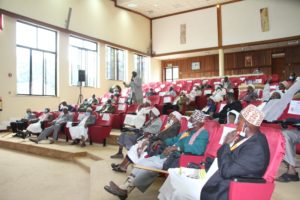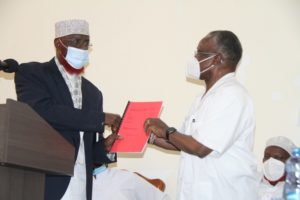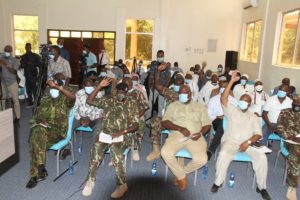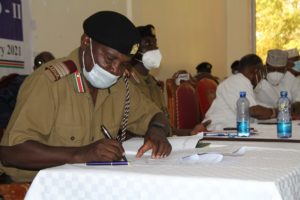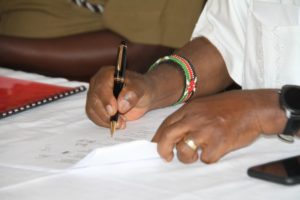FINANCE FOR PEACE - INTERPEACE AND MIRABAUD MARK 10 YEARS OF THEIR PARTNERSHIP FOR PEACE DURING "BUILDING BRIDGES" WEEK
Geneva, 29 november 2021 – In 2011, a long-term partnership was established between Interpeace –an international peacebuilding organisation– and Mirabaud. At a time when an unprecedented global movement is making its mark on sustainable finance, efforts for peace must also be a central focus. Peace is essential for sustainable development and promotes stability, growth and prosperity in countries. Without peace, there can be no economic growth and without inclusive economic growth, there can be no lasting peace.
The number of conflict zones is ever increasing. At present, they concern some 57 countries considered as fragile, i.e. 1.8 billion people in 2021 (2.3 billion in 2030), the equivalent of 85% of the world’s poorest populations. Nearly one third of the world’s population is experiencing situations of conflict and therefore poverty and economic hardship.
“All too often, fragility and recurrent conflicts prevent any sustained development progress in these countries. What is worse, they discourage investment. It is essential to be able to improve the connection between peace work (Sustainable Development Goal 16) and private investment,” says Interpeace President Scott Weber.
It was with this in mind that, a decade ago, Mirabaud and Interpeace built an innovative partnership by setting up a sharing fund investing in emerging countries. “These countries may have the potential for significant growth, but this can be held back or even prevented by recurrent conflicts. It therefore seemed a natural step for us to enter into partnership with an organisation such as Interpeace, which supports endogenous peace processes and thus promotes the conditions for sustainable peace and stability,” explains Lionel Aeschlimann, CEO of Mirabaud Asset Management.
“This strategic support from Mirabaud and its clients has enabled us to provide a concrete response to situations of vulnerability and to be more reactive when needed,” says Scott Weber.
Mirabaud allows its clients to direct part of the profits to Interpeace via a sharing fund, while the asset manager also contributes a portion of its fees.
“We are proud to have supported Interpeace over the last 10 years. This partnership enables us to unite our clients and the Mirabaud Group around a common approach,” adds Lionel Aeschlimann. “Long-term support is essential for any peace process.’’
“This fund structure combining performance and sustainability offers easy access to the cause of peacebuilding for investors wishing to achieve this objective,” summarises Lionel Aeschlimann. “Geneva, with its financial and international expertise, can play a key role in meeting this challenge,” he adds.
Ten years after the formation of this partnership, a movement combining finance and sustainability is now well established, as evidenced by the Building Bridges Conference to be held in Geneva from 29 November to 2 December. “With the creation of this mechanism 10 years ago, Mirabaud demonstrated a real vision of how finance can support peace efforts and we are pleased to be able to build on this,” explains Scott Weber. Interpeace will unveil the outline of its ‘Finance for Peace’ initiative at a panel discussion on 1 December as part of Building Bridges. This project aims to further bridge the worlds of finance, development and peace and will be a platform for collaboration, action and research to develop new financial products for peace. The objective is to contribute to a truly global peace investment market.
Founded in 1994 by the UN, Interpeace is an international peacebuilding organisation based in Geneva. It supports endogenous peace processes in more than 20 contexts and assists the international community and, in particular, the United Nations in strengthening their intervention strategies in fragile contexts.
Its purpose is to support communities to resolve their own conflicts and achieve sustainable peace, without imposing external solutions on the affected countries.
Interpeace
Interpeace is an international peacebuilding organisation. With more than 25 years of experience, it carries peacebuilding processes and supports the international community particular the United Nations in their peace efforts worldwide. Interpeace was officially recognized as an international organization by the Swiss Federal Council in 2018. Interpeace is headquartered in Geneva, Switzerland, and is present in more than 20 fragile contexts around the world.
For more information, please visit our website: www.interpeace.org
Mirabaud Asset Management
With offices in Geneva, Zurich, Luxembourg, Paris, London and Madrid the Mirabaud Group’s Asset Management division focuses on investment management and advisory services.
Its investment capabilities include:
- domestic, regional and global equities ;
- flexible, convertible, high-yield & short duration fixed income ;
- alternatives ;
- multi-asset ;
- private equity.
Across all investments Mirabaud Asset management applies a common philosophy of an active, high conviction approach to generating long-term risk adjusted returns. A focus on managing risk and a commitment towards environmental, social and corporate governance principles are important constituents of Mirabaud’s heritage.
For more information, please visit our website: www.mirabaud-am.com
The Mirabaud Group
The Mirabaud Group was founded in Geneva in 1819. With its four core values of Independence, Conviction, Responsibility and Passion, it has grown over the years into an international group offering its clients personalised financial services and advice in various areas of activity Its expertise lies in Wealth Management (portfolio management, investment advice and services for independent asset managers), Asset Management (institutional management, fund management and distribution) and highly specialised bespoke services (equity research, corporate advisory and intermediation).
Mirabaud has always been strongly committed to responsibility and sustainability. This is reflected in its interactions with clients, employees and society as a whole. As a signatory of the United Nations Principles for Responsible Investment (PRI) since 2010, Mirabaud has the highest rating in this area thanks to its governance and its committed global strategy.
The Group employs around 700 staff and has offices in Switzerland (Geneva, Basel and Zurich), Europe (London, Luxembourg, Paris, Madrid, Barcelona, Valencia and Seville) and the rest of the world (Montreal, Dubai, Abu Dhabi, Montevideo and São Paulo).
For more information, please visit our website: www.mirabaud-am.com
Press contact
Marionna Wegenstein
M. +41 79 410 99 49
mirabaud@dynamicsgroup.ch
Wegenstein Communication,
Partner der Dynamics Group
Luvini Ranasinghe
T. +41 79 475 64 95
ranasinghe@interpeace.org
Interpeace
Maison de la Paix
2E Chemin Eugène-Rigot
1202 Geneva, Switzerland
Lydia Albrecht
T. +41 58 816 27 79
F. +41 58 816 33 90
lydia.albrecht@mirabaud.com
MIRABAUD & Cie AG
Boulevard Georges-Favon 29
1204 Genf, Schweiz









